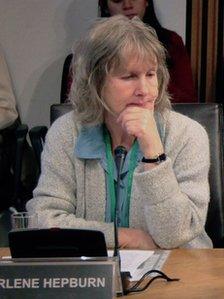Holyrood hears benefit changes are 'heartless'
- Published
A group of people with disabilities have told a Holyrood committee changes to the benefits system are "heartless".
One of those who gave evidence, Ian Megahy, a former veterinary surgeon who has a chronic pain condition, said the system was "offensive".
Mr Megahy called on the UK Work and Pensions Secretary Iain Duncan Smith to visit Scotland and explain the changes.
The UK government said the reforms to the incapacity benefit system were needed.
The group appeared before Holyrood's Welfare Reform Committee as part of its "Your Say" appeal for testimony on the experience of people who claim Employment and Support Allowance (ESA).
The process requires claimants to submit to a medical assessment on their suitability for work.
Another of those speaking to the committee, Marlene Hepburn from Stirling, who has MS, said she thought the process was "heartless".
"My fear is that this whole experience will trigger a relapse," she said.
"The emotional stress has been enormous and has had a detrimental impact on my health.
"I appreciate the benefits system needs to be reformed but not to the detriment of genuine claimants."
'On the scrapheap'
Testimony was also heard from Lesley McMurchie on behalf of her husband, she said: "The state has contributed to making him worse."
"I thought when we set up the welfare state it was to be there for people like my husband, who worked really hard, who did his best, so that in times of need there would be something there. But it's not there.
"He's now not in receipt of any kind of benefits whatsoever. He's basically on the scrapheap now, but he still has another five years to go to get his pension."
A BBC investigation found some claimants of ESA had been labelled "LTB" during the training of assessors, which was said to be shorthand for "lying, thieving bastards".

Marlene Hepburn called the system "heartless"
The private company contracted to carry out the assessments, Triage, told the BBC the term was used in an isolated incident.
Last week, the Department for Work and Pensions (DWP) revealed more than a quarter of Scots on incapacity benefit prior to October 2010 had now been reclassified as "fit for work" - in excess of 17,000 people.
Improving lives
There are 2.5m long-term sick and disabled unemployed people in the UK. The cost to the taxpayer is £13bn a year.
A spokesperson for the DWP said: "The previous system abandoned people to a life on benefits without checking to see if they could, with the right support, go back to work. We've made substantial changes to the work capability assessment and the proportion of people being placed in the Support Group has more than doubled in just two years.
"Employment Support Allowance has regular reassessments to see if a person's condition has improved or worsened, and assess how this affects their ability to work.
"Our reforms will improve the lives of some of the poorest families in our communities."
- Published28 January 2013
- Published28 January 2013
- Published27 November 2012